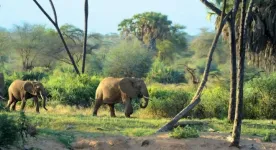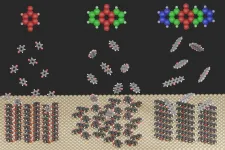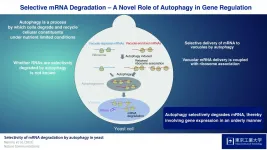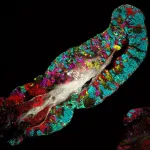(Press-News.org) Over the last 200 years, researchers have worked towards understanding the global distribution of species and ecosystems. But so far even the basic knowledge on the global geography of genetic diversity was limited.
That now changes with a recent paper from Globe Institute. Professor David Nogues Bravo and his team has spent the last eight years combining data from scientific gene banks with scenarios of future climate and land-use change. The result is the first ever global assessment of how it will impact the genetic diversity of mammals, e.g. when tropical forests are converted to agricultural land.
'Our study identifies both genetically poor and highly diverse areas severely exposed to global change, paving the way to better estimate the vulnerability to global change such as rise in temperature as well as land-use changes. It could help countries to find out how much of the genetic diversity in their own country may be exposed to different global change impacts, while also establishing priorities and conservation policies', says David Nogues Bravo.
For example, Northern Scandinavia will be heavily impacted by climate change and not so much from land use change, whereas the tropical areas of the world will suffer from both climate change and land-use change. However, David Nogues Bravo underlines that it is difficult to compare areas.
'The genetic diversity in Scandinavia is always going to be lower than in the tropics, but that doesn't mean that the overall diversity there is not important. If we lose populations and species such as the polar bear, it's just one species but it will it will impact the total stability of ecosystems. However, the largest threat to genetic diversity will be in the tropical areas, which currently harbor the largest diversity of the bricks of life, genes. These regions include ecosystems like mangroves, jungles and grasslands', says David Nogues Bravo.
Putting it all together
The researchers have looked into gene banks with mitochondrial data from mammals. The mitochondria also regulate the metabolism, and by looking how it has changed over time, it can also unveil changes in diversity.
'The mitochondrial diversity is a broad estimate of adaptive capacity. We also used to think that mitochondria was a neutral marker, when it is in fact under selection. That means that some selection may relate to the physiological limits of a species in relation to climate, which makes it a very useful tool for researchers to track how global change impacts the genetic diversity in a specific area', explains David Nogues Bravo.
For many samples, there were not any geographical information available. The researchers used artificial intelligence to add geographical locations and then they built models predicting how much genetic exits in places without data.
Then the researchers analyzed maps of genetic diversity, future climate change and future land-use change, to reveal how and where global change will impact mammals.
Interest from the United Nations-agency
The research has attracted the attention of Secretariat of the United Nations Convention on Biological Diversity. David Nogues Bravo hope that the assessment map could become an important tool for the high-level summits among countries to help define policies for biodiversity protection.
'We are only now starting to have the tools, data and knowledge to understand how genetic diversity changes across the globe. In a decade from now, we will be able to know also how much of that genetic diversity has been lost since the Industrial Revolution for thousands of species and in a stronger position to bring effective measures to protect it', he says.
In the coming years, he hopes that scientists will map the global genetic diversity of many other forms of life, including plants, fungi and animals across the lands, rivers and oceans.
'Have been attempts to map the genetic diversity for amphibians, birds and reptiles, but we don't have maps for plants, insects or fungi. And whereas there are around 5000 mammal species, there are many more insect or fungi species, maybe millions. We don't even know how many, yet. So it will take longer, but it will come in the next decade', he says.
'We hope to see more of these assessments in the next decade, and to complement then with long-term monitoring programs, in which we can monitor the genetic diversity of thousands of species and ecosystems across the planet continually', says David Nogues Bravo.
INFORMATION:
Singapore, 19 April, 2021 - Researchers at the Future Urban Mobility (FM) Interdisciplinary Research Group (IRG) at Singapore-MIT Alliance for Research and Technology (SMART), MIT's research enterprise in Singapore, have created a synthetic framework known as theory-based residual neural network (TB-ResNet), which combines discrete choice models (DCMs) and deep neural networks (DNNs), also known as deep learning, to improve individual decision-making analysis used in travel behaviour research.
In this research paper, Theory-based residual neural networks: A synergy of discrete choice models and deep neural networks, ...
The production of nanomaterials involves self-assembly processes of functionalized (organic) molecules on inorganic surfaces. This combination of organic and inorganic components is essential for applications in organic electronics and other areas of nanotechnology.
Until now, certain desired surface properties were often achieved on a trial-and-error basis. Molecules were chemically modified until the best result for the desired surface property was found. However, the processes controlling the self-assembly of molecules at interfaces are so complex ...
Liquid Crystals (LC) are widely deployed in display technology and optical fibres. From smartphones in your pockets to large screen TVs, LCs are everywhere, as this special state of matter has been found in colorful soap bubbles as well as certain living tissues.
But LCs are by no means limited to use in gadgets or electronic devices. For quite some time, scientists have been studying the possibility of creating "active nematics", a particular class of active LCs, which consist of self-driven units capable of converting chemical or other forms of energy into motion. When administered the proper stimuli, scientists have found that they can generate a predictable response from different LCs, which allows for design of smart, multifunctional ...
A team of researchers from the Hebrew University of Jerusalem has proven the linkages between ultra-processed foods and reduced bone quality, unveiling the damage of these foods particularly for younger children in their developing years. The study, led by Professor Efrat Monsonego-Ornan and Dr. Janna Zaretsky from the Department of Biochemistry, Food Science and Nutrition at the University's Faculty of Agriculture, was published in the journal Bone Research and serves as the first comprehensive study of the effect of widely-available food products on skeleton development.
Ultra-processed foods--aka, junk food--are ...
DALLAS, April 19, 2021 — Gender-affirming hormone therapy (GAHT) was associated with blood pressure changes in both transgender men and women, according to new research published today in Hypertension, an American Heart Association journal. Given the higher burden of heart attack, stroke and other cardiovascular conditions among transgender men and women, blood pressure screening and monitoring are important, especially after beginning hormone therapies.
Although doctors have prescribed gender-affirming hormone therapy to transgender men and women for more than 25 years, researchers and health care professionals know little about rates of hypertension and how the effects on blood ...
Scientists have for the first time captured the complex dynamics of particle movement in granular materials, helping to explain why mixed nuts often see the larger Brazil nuts gather at the top. The findings could have vital impact on industries struggling with the phenomenon, such as pharmaceuticals and mining.
Many people will have the experience of dipping their hands into a bag of mixed nuts only to find the Brazil nuts at the top. This effect can also be readily observed with cereal boxes, with the larger items rising to the top. Colloquially, this phenomenon of particles segregating by their size is known as the 'Brazil-nut effect' and also has huge implications for industries where uneven mixing can critically degrade product quality.
Now, for the first time, scientists at The ...
Optimal cell function requires a fine balance between the synthesis and degradation of biomolecules. Autophagy is the process by which cells degrade and recycle their own components, helping to clean up and maintain the cell's internal environment and ensure the smooth functioning of cellular processes. Autophagy is strongly induced when cells are subjected to stresses like nutrient deprivation, acting under such conditions to supply nutrients through its breakdown of unneeded cellular material.
Autophagy substrates are delivered to vacuoles in yeast or lysosomes in mammals for degradation by double-membrane vesicles called "autophagosomes". While autophagy was originally considered a non-selective process that isolates substrates in the cytoplasm of ...
With alarms sounding about the declining diversity of plants and animals, a related concern with equally profound implications is posed: is the variety of microbial life, including viruses, changing too -- and if so, in which direction and how fast?
In a paper published today, David S. Thaler of the University of Basel, Switzerland, and Guest Investigator at The Rockefeller University's Programme for the Human Environment (PHE), notes the well-documented, "clearly downwards" trajectory of plant and animal diversity, constituting "a key issue of the Anthropocene."
Whether change is underway also in the world of microbes -- the tiniest cogs in planetary functioning -- is "a complete unknown. We have no idea whether global microbial diversity is increasing, decreasing, or staying ...
Anyone sexually active under age 30 should be offered testing for chlamydia and gonorrhea, according to a new guideline from the Canadian Task Force on Preventive Health Care published in CMAJ (Canadian Medical Association Journal).
Chlamydia and gonorrhea are the most commonly reported sexually transmitted bacterial infections (STIs) in Canada and are treatable with antibiotics. Without treatment, these infections can lead to pelvic inflammatory disease, pain and possibly infertility.
"If people are under 30 and sexually active, it's a good idea to get tested," says Dr. Ainsley Moore, a family physician and associate clinical professor, Department of Family Medicine, McMaster University, and chair of the task force chlamydia ...
Videoconferences may be less exhausting if participants feel some sense of group belonging, according to new research published by the American Psychological Association.
As remote work and the use of videoconferences have dramatically increased during the coronavirus pandemic, more people are fatigued from meeting through computer screens instead of in person. In this study, 55 employees in various fields in the United States were surveyed about their feelings about videoconferences. The researchers thought longer meetings and being on video would cause the most fatigue, but their findings surprised them, said lead researcher Andrew Bennett, PhD, an assistant professor at Old Dominion University.
"We expected that aspects of being on video would be related to fatigue, such ...





